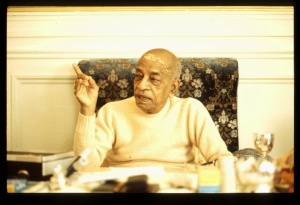SB 10.69.7-8: Difference between revisions
m (1 revision(s)) |
(Vanibot #0018 edit: make synonym terms in Sanskrit italic in SB - Vanisource) |
||
| Line 1: | Line 1: | ||
{{info | {{info | ||
|speaker= | |speaker=Śukadeva Gosvāmī | ||
|listener=King | |listener=King Parīkṣit | ||
}} | }} | ||
[[Category:Srimad-Bhagavatam - Canto 10 Chapter 69|s07-08]] | |||
[[Category:Bhagavatam Verses Spoken by Sukadeva Gosvami - Vanisource|106907]] | |||
<div style="float:left">'''[[Srimad-Bhagavatam]] - [[SB 10|Tenth Canto]] - [[SB 10.69: Narada Muni Visits Lord Krsna's Palaces in Dvaraka|Chapter 69: Nārada Muni Visits Lord Kṛṣṇa's Palaces in Dvārakā]]'''</div> | |||
<div style="float:right">[[File:Go-previous.png|link=SB 10.69.1-6]] '''[[SB 10.69.1-6]] - [[SB 10.69.9-12]]''' [[File:Go-next.png|link=SB 10.69.9-12]]</div> | |||
{{RandomImage}} | |||
{{SBnotice}} | |||
==== TEXTS 7-8 ==== | ==== TEXTS 7-8 ==== | ||
<div | <div class="verse"> | ||
tasyām antaḥ-puraṁ śrīmad | :tasyām antaḥ-puraṁ śrīmad | ||
arcitaṁ sarva-dhiṣṇya-paiḥ | :arcitaṁ sarva-dhiṣṇya-paiḥ | ||
hareḥ sva-kauśalaṁ yatra | :hareḥ sva-kauśalaṁ yatra | ||
tvaṣṭrā kārtsnyena darśitam | :tvaṣṭrā kārtsnyena darśitam | ||
tatra ṣoḍaśabhiḥ sadma- | |||
sahasraiḥ samalaṅkṛtam | :tatra ṣoḍaśabhiḥ sadma- | ||
viveśaikatomaṁ śaureḥ | :sahasraiḥ samalaṅkṛtam | ||
patnīnāṁ bhavanaṁ mahat | :viveśaikatomaṁ śaureḥ | ||
:patnīnāṁ bhavanaṁ mahat | |||
</div> | </div> | ||
| Line 21: | Line 27: | ||
==== SYNONYMS ==== | ==== SYNONYMS ==== | ||
<div | <div class="synonyms"> | ||
''tasyām''—in that (Dvārakā); ''antaḥ-puram''—the private royal precinct; ''śrī-mat''—opulent; ''arcitam''—worshiped; ''sarva''—all; ''dhiṣṇya''—of the various planetary systems; ''paiḥ''—by the maintainers; ''hareḥ''—of Lord Hari; ''sva''—his own; ''kauśalam''—expertise; ''yatra''—where; ''tvaṣṭrā''—by Tvaṣṭā (Viśvakarmā, the architect of heaven); ''kārtsnyena''—completely; ''darśitam''—shown; ''tatra''—there; ''ṣoḍaśabhiḥ''—with sixteen; ''sadma''—of residences; ''sahasraiḥ''—thousands; ''samalaṅkṛtam''—beautified; ''viveśa''—(Nārada) entered; ''ekatamam''—one of them; ''śaureḥ''—Lord Kṛṣṇa's; ''patnīnām''—of the wives; ''bhavanam''—palace; ''mahat''—great. | |||
</div> | </div> | ||
{{SBcollapse}} | |||
==== TRANSLATION ==== | ==== TRANSLATION ==== | ||
<div | <div class="translation"> | ||
In the city of Dvārakā was a beautiful private quarter worshiped by the planetary rulers. This district, where the demigod Viśvakarmā had shown all his divine skill, was the residential area of Lord Hari, and thus it was gorgeously decorated by the sixteen thousand palaces of Lord Kṛṣṇa's queens. Nārada Muni entered one of these immense palaces. | In the city of Dvārakā was a beautiful private quarter worshiped by the planetary rulers. This district, where the demigod Viśvakarmā had shown all his divine skill, was the residential area of Lord Hari, and thus it was gorgeously decorated by the sixteen thousand palaces of Lord Kṛṣṇa's queens. Nārada Muni entered one of these immense palaces. | ||
</div> | </div> | ||
| Line 35: | Line 41: | ||
==== PURPORT ==== | ==== PURPORT ==== | ||
<div | <div class="purport"> | ||
Śrīla Jīva Gosvāmī points out that Tvaṣṭā, Viśvakarmā, manifested the expertise of the Supreme Lord, and thus he was able to build such exquisite palaces. Śrīla Prabhupāda writes, "The great kings and princes of the world used to visit these palaces just to worship [Lord Kṛṣṇa]. The architectural plans were made personally by Viśvakarmā, the engineer of the demigods, and in the construction of the palaces he exhibited all of his talents and ingenuity." | Śrīla Jīva Gosvāmī points out that Tvaṣṭā, Viśvakarmā, manifested the expertise of the Supreme Lord, and thus he was able to build such exquisite palaces. Śrīla Prabhupāda writes, "The great kings and princes of the world used to visit these palaces just to worship [Lord Kṛṣṇa]. The architectural plans were made personally by Viśvakarmā, the engineer of the demigods, and in the construction of the palaces he exhibited all of his talents and ingenuity." | ||
</div> | </div> | ||
__NOTOC__ | </div> | ||
</div> | |||
<div style="float:right">[[File:Go-previous.png|link=SB 10.69.1-6]] '''[[SB 10.69.1-6]] - [[SB 10.69.9-12]]''' [[File:Go-next.png|link=SB 10.69.9-12]]</div> | |||
__NOTOC__ | |||
__NOEDITSECTION__ | |||
Revision as of 18:17, 1 December 2017

A.C. Bhaktivedanta Swami Prabhupada
Please note: The synonyms, translation and purport of this verse were composed by disciples of Śrīla Prabhupāda
TEXTS 7-8
- tasyām antaḥ-puraṁ śrīmad
- arcitaṁ sarva-dhiṣṇya-paiḥ
- hareḥ sva-kauśalaṁ yatra
- tvaṣṭrā kārtsnyena darśitam
- tatra ṣoḍaśabhiḥ sadma-
- sahasraiḥ samalaṅkṛtam
- viveśaikatomaṁ śaureḥ
- patnīnāṁ bhavanaṁ mahat
SYNONYMS
tasyām—in that (Dvārakā); antaḥ-puram—the private royal precinct; śrī-mat—opulent; arcitam—worshiped; sarva—all; dhiṣṇya—of the various planetary systems; paiḥ—by the maintainers; hareḥ—of Lord Hari; sva—his own; kauśalam—expertise; yatra—where; tvaṣṭrā—by Tvaṣṭā (Viśvakarmā, the architect of heaven); kārtsnyena—completely; darśitam—shown; tatra—there; ṣoḍaśabhiḥ—with sixteen; sadma—of residences; sahasraiḥ—thousands; samalaṅkṛtam—beautified; viveśa—(Nārada) entered; ekatamam—one of them; śaureḥ—Lord Kṛṣṇa's; patnīnām—of the wives; bhavanam—palace; mahat—great.
Translation and purport composed by disciples of Śrīla Prabhupāda
TRANSLATION
In the city of Dvārakā was a beautiful private quarter worshiped by the planetary rulers. This district, where the demigod Viśvakarmā had shown all his divine skill, was the residential area of Lord Hari, and thus it was gorgeously decorated by the sixteen thousand palaces of Lord Kṛṣṇa's queens. Nārada Muni entered one of these immense palaces.
PURPORT
Śrīla Jīva Gosvāmī points out that Tvaṣṭā, Viśvakarmā, manifested the expertise of the Supreme Lord, and thus he was able to build such exquisite palaces. Śrīla Prabhupāda writes, "The great kings and princes of the world used to visit these palaces just to worship [Lord Kṛṣṇa]. The architectural plans were made personally by Viśvakarmā, the engineer of the demigods, and in the construction of the palaces he exhibited all of his talents and ingenuity."